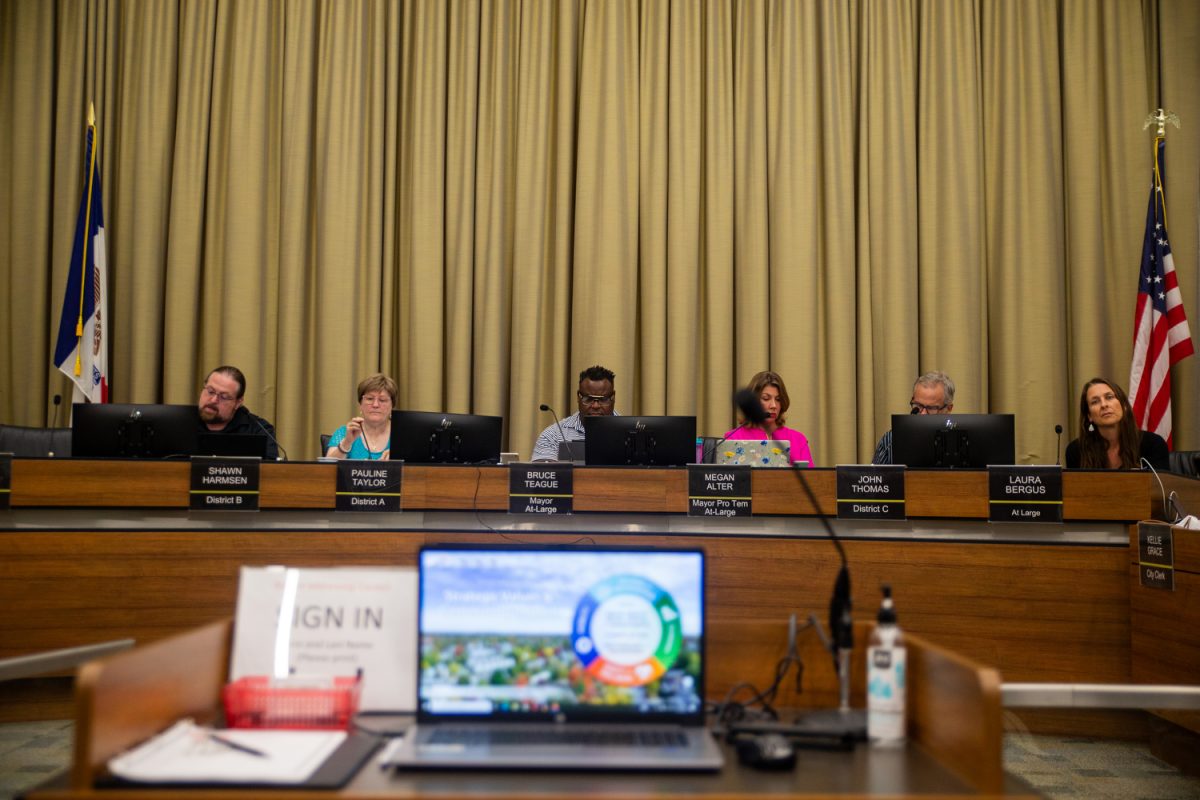The City of Iowa City’s next budget is almost certain to be tight because of several financial stressors, including property tax reforms, slow tax base growth, and inflation.
These financial pressures have led to a decrease in one of the main sources of revenue for the city, which is a fiscal environment that could potentially mean future budget cuts if it continues or worsens.
At the Iowa City City Council’s Sept. 5 work session, the council outlined its budget priorities as well as challenges for fiscal 2025, which begins July 1, 2024.
At the work session, as well as in the Aug. 31 information packet, City Manager Geoff Fruin brought up the property tax reform legislation that was passed in the last legislative session.
One of the biggest issues facing the budget this year is the phasing out of the city’s emergency and library levies over the next four years, which are also used to help fund city climate action programs, Fruin said.
Both levies amount to around $2 million. The city will now have to find a way to fit those services — funded by the two levies — into the general fund, he said. In fiscal 2024 — the budget year that began July 1 and ends June 30, 2024 — the city’s general fund budget is approximately $73 million.
“Assuming that we don’t want to change service levels either at our library or with our climate action programming, we have the task of trying to absorb that in the general fund, which of course is also the funding for our public safety, our parks and [recreation], our general government, and many other operations as well,” Fruin said.
Various tax reforms legislation has also meant certain properties are paying less on their property taxes, meaning less revenue for the city, Fruin said.
In 2013, the Iowa Legislature passed a bill that dropped the amount of property tax revenue that could be made on multifamily properties, going from 100 percent taxability in fiscal 2014 to 54.65 percent in fiscal 2024, the packet states.
Data visualization by Natalie Dunlap
To try to help local governments recoup the lost revenue from property taxes, the 2013 tax reform bill also put in place backfill payments to help supplement cities’ revenue. However, the city will no longer receive such payments by fiscal 2026, the packet states.
The city’s taxable base, or properties in which the city can make revenue from property taxes, has also been in decline, Fruin said. The information packet states the city experienced a 0.8 percent decrease from fiscal 2023-24, which is by far the lowest decline in a two-year cycle in the past ten years.
Additionally, inflation has driven up expenses in the city’s budget, Fruin said.
“Things like gasoline, heat, chemicals, those types of things, have impacted budgets well beyond the traditionally expected three to four percent growth in those line items,” he said.
Given these stressors, Fruin said it is unlikely any major service expansions will be able to be funded, but the city isn’t at a point where it will have to start making budget cuts. However, these trends are not sustainable and may lead to cuts in the future if things don’t change, he said.
“I don’t think we’re there yet, but certainly when you look at two years of negative taxable growth, that’s a trend that we can’t continue,” Fruin said.
City staff will do its best to ensure city services are maintained, he said.
Data visualization by Natalie Dunlap
In terms of budget priorities for the next fiscal year, Mayor Pro Tem Megan Alter said she would like to prioritize creating services, like child care, free transport, and affordable housing, in the next budget that help make citizens’ lives equitable.
Alter said these services could help prevent citizens from reaching a point where they are under such strain that they have a mental health crisis.
RELATED: Iowa City city officials concerned about future budget cuts
“One option is to really look at, ‘What are the core things that people are really struggling with, and even if they’re big, should we prioritize those so that maybe some of the other things that we also have on our strategic plan are mitigated by virtue of some of the larger potential solutions?’” Alter said.
Mayor Bruce Teague brought up the issue of chronic homelessness in Iowa City as a priority he is set on. Specifically, he said collaborating with other municipalities in Johnson County to tackle this issue would be beneficial to help support those in need of housing.
“In our community, we talk about housing as being a human right,” Teague said. “I think if we were to really work collaboratively with other providers or municipalities in Johnson County, I really think we can make a continued effort in what we’re doing with homelessness.”
Each of the city departments is working to draft its budgets, which will eventually be presented to the council around January to be deliberated on, Fruin said. The budget will then be finalized in the spring of next year.



